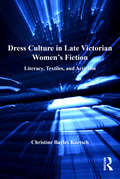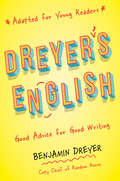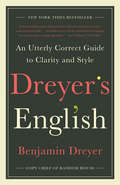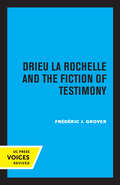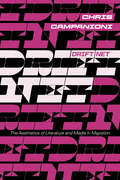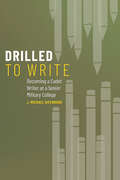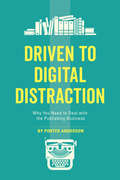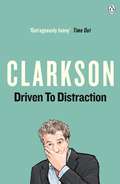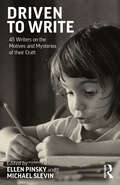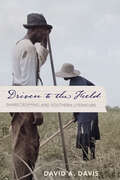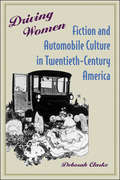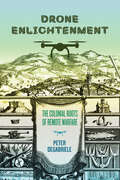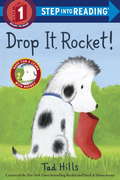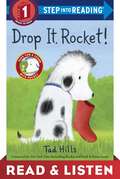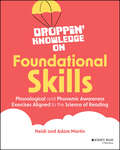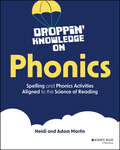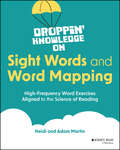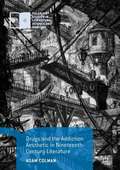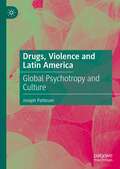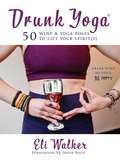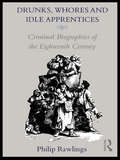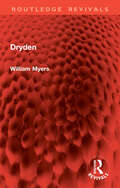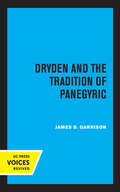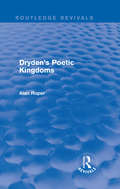- Table View
- List View
Dress Culture in Late Victorian Women's Fiction: Literacy, Textiles, and Activism
by Christine Bayles KortschIn her immensely readable and richly documented book, Christine Bayles Kortsch asks us to shift our understanding of late Victorian literary culture by examining its inextricable relationship with the material culture of dress and sewing. Even as the Education Acts of 1870, 1880, and 1891 extended the privilege of print literacy to greater numbers of the populace, stitching samplers continued to be a way of acculturating girls in both print literacy and what Kortsch terms "dress culture." Kortsch explores nineteenth-century women's education, sewing and needlework, mainstream fashion, alternative dress movements, working-class labor in the textile industry, and forms of social activism, showing how dual literacy in dress and print cultures linked women writers with their readers. Focusing on Victorian novels written between 1870 and 1900, Kortsch examines fiction by writers such as Olive Schreiner, Ella Hepworth Dixon, Margaret Oliphant, Sarah Grand, and Gertrude Dix, with attention to influential predecessors like Elizabeth Gaskell, Charlotte Brontë, and George Eliot. Periodicals, with their juxtaposition of journalism, fiction, and articles on dress and sewing are particularly fertile sites for exploring the close linkages between print and dress cultures. Informed by her examinations of costume collections in British and American museums, Kortsch's book broadens our view of New Woman fiction and its relationship both to dress culture and to contemporary women's fiction.
Dressed to Kill
by Elizabeth RhodesThe noble wives in María de Zayas's Desengaños suffer terrible fates: one is beheaded, another poisoned, one is cemented into a chimney, while yet another is locked into a tiny wall closet where she dies. The hallmark of Zayas's aesthetics, these characters are the central reason why her fiction has increased in popularity through the ages. Yet their stories pose an apparent contradiction between the author's pro-female rhetoric and her gusto for killing model women, then beautifying their mutilated cadavers.Dressed to Kill reconciles Zayas's Desengaños with the age in which it was written, contextualizing the book in baroque poetics, the Spanish honour code, and fifteenth-century martyr saints' lives. Elizabeth Rhodes elegantly uncovers Zayas's intention to reform the Spanish nobility by displaying noble misbehaviour and its deadly consequences. Her book concludes by detailing the Desengaños' intriguing influence on the aesthetic base of Gothic literature by revealing that its authors were avid readers of Zayas.
Dreyer's English (Adapted for Young Readers): Good Advice for Good Writing
by Benjamin DreyerAdapted from the New York Times bestseller by Random House's longtime copy chief, this informative and witty guide to writing and grammar, written especially for a younger audience, entertains as well as instructs.Full of advice, insider wisdom, and fascinating facts, this book will prove to be invaluable to anyone who wants to be confident in their writing skills, or anyone who enjoys the power of language. Explored throughout are the mysteries of using punctuation, word choice decisions, and more, presented in a clear, concise and accessible manner made fun!Praise for the New York Times bestseller DREYER'S ENGLISH: An Utterly Correct Guide to Clarity and StyleNAMED ONE OF THE BEST BOOKS OF THE YEAR BY O: The Oprah Magazine,Paste, and Shelf Awareness"Essential (and delightful!)" --People"Playful, smart, self-conscious, and personal . . . One encounters wisdom and good sense on nearly every page." --The Wall Street Journal"Destined to become a classic." --The Millions"Dreyer can help you . . . with tips on punctuation and spelling. . . . Even better: He'll entertain you while he's at it." --Newsday
Dreyer's English: An Utterly Correct Guide to Clarity and Style
by Benjamin DreyerNEW YORK TIMES BESTSELLER • A sharp, funny grammar guide they&’ll actually want to read, from Random House&’s longtime copy chief and one of Twitter&’s leading language gurus NAMED ONE OF THE BEST BOOKS OF THE YEAR BY O: The Oprah Magazine • Paste • Shelf Awareness&“Essential (and delightful!)&”—People We all write, all the time: books, blogs, emails. Lots and lots of emails. And we all want to write better. Benjamin Dreyer is here to help. As Random House&’s copy chief, Dreyer has upheld the standards of the legendary publisher for more than two decades. He is beloved by authors and editors alike—not to mention his followers on social media—for deconstructing the English language with playful erudition. Now he distills everything he has learned from the myriad books he has copyedited and overseen into a useful guide not just for writers but for everyone who wants to put their best prose foot forward. As authoritative as it is amusing, Dreyer&’s English offers lessons on punctuation, from the underloved semicolon to the enigmatic en dash; the rules and nonrules of grammar, including why it&’s OK to begin a sentence with &“And&” or &“But&” and to confidently split an infinitive; and why it&’s best to avoid the doldrums of the Wan Intensifiers and Throat Clearers, including &“very,&” &“rather,&” &“of course,&” and the dreaded &“actually.&” Dreyer will let you know whether &“alright&” is all right (sometimes) and even help you brush up on your spelling—though, as he notes, &“The problem with mnemonic devices is that I can never remember them.&” And yes: &“Only godless savages eschew the series comma.&” Chockful of advice, insider wisdom, and fun facts, this book will prove to be invaluable to everyone who wants to shore up their writing skills, mandatory for people who spend their time editing and shaping other people&’s prose, and—perhaps best of all—an utter treat for anyone who simply revels in language.Praise for Dreyer&’s English&“Playful, smart, self-conscious, and personal . . . One encounters wisdom and good sense on nearly every page of Dreyer&’s English.&”—The Wall Street Journal &“Destined to become a classic.&”—The Millions &“Dreyer can help you . . . with tips on punctuation and spelling. . . . Even better: He&’ll entertain you while he&’s at it.&”—Newsday
Drieu La Rochelle and the Fiction of Testimony
by Frederic J. GroverThis title is part of UC Press's Voices Revived program, which commemorates University of California Press’s mission to seek out and cultivate the brightest minds and give them voice, reach, and impact. Drawing on a backlist dating to 1893, Voices Revived makes high-quality, peer-reviewed scholarship accessible once again using print-on-demand technology. This title was originally published in 1958.
Drift Net: The Aesthetics of Literature and Media in Migration
by Chris CampanioniToday’s aesthetic strategies to compose content and identity across digital media are neither new nor exclusively digital, but emerged from migration. In Drift Net: The Aesthetics of Literature and Media in Migration, Chris Campanioni theorizes an aesthetics of transmedia as a framework for civic activism, while showing how migrants have forecasted and reshaped new media practices and norms, producing a political subjectivity that resists subjectification. As borders, global inequality, racism, and xenophobia proliferate, migrants continue to enact the possibilities of something else, beyond being spoken about and spoken for. Through a model Campanioni calls a “migratory text,” Drift Net advances a theory of literature and art born in translation that calls into question established theories of world literature, national literatures, literary periodization, and translation itself. Through an analysis of works born in translation and produced in passage, detention, and exile, Campanioni utilizes this model to read creatively across a wide range of social and political formations, from the experience of his parents' exiles to alternative housing initiatives and asylum reform efforts throughout Europe, including the largest LGBT+ refugee center in the world. Drawing on a mixed methodology of qualitative interviews with asylum applicants and shelter directors, textual analysis, and autoethnographic narrative, Drift Net traces literary developments alongside contemporary social and political interventions. This approach proposes interventions on the organizational levels of asylum, integration, public housing, and membership. It also marks the ways migrant creators have reformulated subjectivity through the same genres and modes that have contributed to their devaluation as minoritized subjects. Drift Net both deepens and broadens our conceptualization of migrant literature, and recovers an understanding and application of transmedia that predates digital cultures. Campanioni offers a wide-ranging study of texts including Edward Said and Jean Mohr’s After the Last Sky: Palestinian Lives, Edgar Garcia’s Skins of Columbus, Anna Seghers’s Transit, Francis Ponge’s Soap, Walid Raad’s The Atlas Group, Klára Hosnedlová’s embroidered paintings, Reem Karssli and Caroline Williams’s Now is the Time To Say Nothing, Cornelia Schleime’s paper prints, and more. Drift Net formulates the “migratory” as a site of artistic production, resistance, and possibility, where theory is not an end but the beginning of tools and practices that might help researchers, instructors, and organizers to develop their strategies.
Drilled to Write: Becoming a Cadet Writer at a Senior Military College
by J. Michael RifenburgDrilled to Write offers a rich account of US Army cadets navigating the unique demands of Army writing at a senior military college. In this longitudinal case study, J. Michael Rifenburg follows one cadet, Logan Blackwell, for four years and traces how he conceptualizes Army writing and Army genres through immersion in military science classes, tactical exercises in the Appalachian Mountains, and specialized programs like Airborne School. Drawing from research on rhetorical genre studies, writing transfer, and materiality, Drilled to Write speaks to scholars in writing studies committed to capturing how students understand their own writing development. Collectively, these chapters articulate four ways Blackwell leveraged resources through ROTC to become a cadet writer at this military college. Each chapter is dedicated to one year of his undergraduate experience with focus on curricular writing for his business management major and military science classes as well as his extracurricular writing, like his Ballroom Dance Club bylaws and a three-thousand-word short story. In Drilled to Write, Rifenburg invites readers to see how cadets are positioned between civilian and military life—a curiously liminal space where they develop as writers. Using Army ROTC as an entry into genre theory and larger conversations about the role higher education plays in developing Army officers, he shows how writing students develop genre awareness and flexibility while forging a personal identity.
Driven to Digital Distraction: Why You Need to Deal with the Publishing Business
by Porter Anderson"Publishing has now entered a state of continual change. That won't change." So says journalist and industry expert Porter Anderson in "Driven to Digital Distraction." In this exclusive e-book, you'll learn how and why you must become a digitally minded author to compete in the marketplace and treat your writing like a business rather than a hobby. Porter Anderson (@Porter_Anderson), BA, MA, MFA, is a journalist, speaker, and consultant specializing in book publishing. Formerly with CNN, the Village Voice, the Dallas Times Herald, and other media, he is editor in chief of Publishing Perspectives, the magazine for the international publishing industry, founded by German Book Office New York. With Jane Friedman, he produces The Hot Sheet newsletter, providing publishing industry news expressly for authors in a biweekly e-mail subscription. Anderson also writes the #MusicForWriters series on contemporary composers for Thought Catalog and is the former associate editor of TheFutureBook for London's The Bookseller. Learn more about Porter at porteranderson.com.
Driven to Distraction
by Jeremy ClarksonJeremy Clarkson is once more Driven to Distraction.Brace yourself. Clarkson's back.And he'd like to tell you what he thinks about some of the most awe-inspiring, earth-shatteringly fast and jaw-droppingly cool cars in the world (oh, and a few irredeemable disasters...).Or he would if he could just get one or two things off his chest first. Matters such as: * The prospect of having Terry Wogan as president* Why you'll never see a woman driving a Lexus * The unforeseen consequences of inadequate birth control * Why everyone should spend a weekend with a diggerDriven to Distraction is Jeremy Clarkson at full throttle. So buckle up, sit tight and enjoy the ride. You're in for a hell of a lot of laughs. Praise for Jeremy Clarkson:'Brilliant . . . laugh-out-loud' Daily Telegraph'Outrageously funny . . . will have you in stitches' Time Out'Very funny . . . I cracked up laughing on the tube' Evening Standard
Driven to Write: 45 Writers on the Motives and Mysteries of their Craft
by Ellen Pinsky Michael SlevinIn this book of essays, over 40 successful writers in varied fields —poetry, science, the performing and visual arts, psychoanalysis, journalism, literature and more— explore what drives them to write, and to work at their craft.In contributions arranged under three headings— “Models and Mentors,” “Urges and Traumas,” and “Evidence and Experiences”—each writer explores their personal understanding of writing as a psychological necessity. In varying ways, these candid, often emotional essays reveal a range of intimate, mysterious and unpredictable purposes and motivations.Driven to Write provides fresh, practical, and imaginative approaches to literary art for aspiring and established writers alike.
Driven to the Field: Sharecropping and Southern Literature (The American South Series)
by David A. DavisDriven to the Field traces the culture of sharecropping—crucial to understanding life in the southern United States—from Emancipation to the twenty-first century. By reading dozens of works of literature in their historical context, David A. Davis demonstrates how sharecropping emerged, endured for a century, and continues to resonate in American culture. Following the end of slavery, sharecropping initially served as an expedient solution to a practical problem, but it quickly developed into an entrenched power structure situated between slavery and freedom that exploited the labor of Blacks and poor whites to produce agricultural commodities.Sharecropping was the economic linchpin in the South’s social structure, and the region’s political system, race relations, and cultural practices were inextricably linked with this peculiar form of tenant farming from the end of the Civil War through the civil rights movement. Driven to the Field analyzes literary portrayals of this system to explain how it defined the culture of the South, revealing multiple genres of literature that depicted sharecropping, such as cotton romances, agricultural uplift novels, proletarian sharecropper fiction, and sharecropper autobiographies—important works of American literature that have never before been evaluated and discussed in their proper context.
Driving Women: Fiction and Automobile Culture in Twentieth-Century America
by Deborah ClarkeOver the years, cars have helped to define the experiences and self-perceptions of women in complex and sometimes unexpected ways. When women take the wheel, family structure and public space are reconfigured and re-gendered, creating a context for a literary tradition in which the car has served as a substitute for, an escape from, and an extension of the home, as well as a surrogate mother, a financial safeguard, and a means of self-expression.Driving Women examines the intersection of American fiction—primarily but not exclusively by women—and automobile culture. Deborah Clarke argues that issues critical to twentieth-century American society—technology, mobility, domesticity, and agency—are repeatedly articulated through women's relationships with cars. Women writers took surprisingly intense interest in car culture and its import for modern life, as the car, replete with material and symbolic meaning, recast literal and literary female power in the automotive age. Clarke draws on a wide range of literary works, both canonical and popular, to document women's fascination with cars from many perspectives: historical, psychological, economic, ethnic. Authors discussed include Wharton, Stein, Faulkner, O’Connor, Morrison, Erdrich, Mason, Kingsolver, Lopez, Kadohata, Smiley, Senna, Viramontes, Allison, and Silko. By investigating how cars can function as female space, reflect female identity, and reshape female agency, this engaging study opens up new angles from which to approach fiction by and about women and traces new directions in the intersection of literature, technology, and gender.
Drone Enlightenment: The Colonial Roots of Remote Warfare
by Peter DeGabrieleDrone warfare raises far-reaching questions about responsibility, war, and sovereignty. Who can be held accountable for drone strikes? Do drones conduct wars of national territories and sovereign boundaries? What does the occupation of a land or people look like if there are no boots on the ground? Focusing specifically on the United States' use of killer drones during the War on Terror, Drone Enlightenment argues that this kind of warfare has its intellectual, ideological, and practical roots in the way the Enlightenment imagined moral agency, occupation, race, and sovereignty. As a consequence of seeing drone warfare as a creature of the Enlightenment, and through innovative readings of Hobbes, Locke, Grotius, Pufendorf, Barbeyrac, and Swift, the book also reevaluates the Enlightenment itself.
Drop It, Rocket! (Step into Reading)
by Tad HillsRocket, the beloved dog from the New York Times bestselling picture books How Rocket Learned to Read and Rocket Writes a Story, is back in a leveled reader. Rocket is ready to find new words for his word tree with his teacher, the little yellow bird. He finds a leaf, a hat, and a star . . . but when he finds a red boot, he doesn't want to let go. What will make Rocket drop it? With predictable patterns, simple words, lots of repetition, and bright, colorful illustrations, young readers will love this new Rocket book, which they can read all by themselves!
Drop It, Rocket!: Read & Listen Edition (Rocket)
by Tad HillsRocket, the beloved dog from the New York Times bestselling picture books How Rocket Learned to Read and Rocket Writes a Story, is back in a leveled reader. Rocket is ready to find new words for his word tree with his teacher, the little yellow bird. He finds a leaf, a hat, and a star . . . but when he finds a red boot, he doesn&’t want to let go. What will make Rocket drop it? With predictable patterns, simple words, lots of repetition, and bright, colorful illustrations, young readers will love this new Rocket book, which they can read all by themselves!This Read & Listen edition contains audio narration.
Droppin' Knowledge on Foundational Skills: Phonological and Phonemic Awareness Exercises Aligned to the Science of Reading
by Adam Martin Heidi MartinFun activities, games, and tips to teach phonics to kids, written by teachers and backed by research Droppin' Knowledge on Foundational Skills: Phonological and Phonemic Awareness Exercises Aligned to Science of Reading is an essential companion for anyone teaching kids how to read, showing exactly what works, why it works, and how to do it. Written by Heidi and Adam Martin, two veteran teachers and popular education influencers determined to solve the literacy crisis, this book distills the latest research in the science of phonological and phonemic awareness and makes it accessible to all, regardless of experience or depth of formal training. In this book, readers will explore: Word awareness, syllables, rhyming, onset and rime, phonemic isolation, blending, segmentation, addition, and deletion Practical strategies and tips to get kids ready to ensure kids have the foundational literacy skills they need to be successful readers and spellers Fun reproducibles and games that can be used as warm-ups and supplementary material to lesson plans Droppin' Knowledge on Foundational Skills: Phonological and Phonemic Awareness Exercises Aligned to Science of Reading earns a well-deserved spot on the bookshelves of all elementary and middle school teachers, literary coaches, reading specialists and tutors, and parents.
Droppin' Knowledge on Phonics: Spelling and Phonics Activities Aligned to the Science of Reading
by Adam Martin Heidi MartinReproducible, research-based activities to help K-5 students learn phonics and spelling, fast Educators and parents know we are facing a literacy crisis, but few know what to about it. Droppin' Knowledge on Phonics is an action-oriented guide written by experienced educators to bridge the gap between research and practice. Drawing on the latest evidence on how K-8 students learn best, Heidi Martin and Adam Martin have developed reproducible activities, games, and practical tips to bolster phonics and spelling curricula. All the books in the Droppin' Knowledge series contain ready-to-go resources that you can use within your existing curriculum. These activities are perfect as warm-ups, homework, extra credit assignments, or in-class additions to your lesson plans. Deepen learners' understanding of important phonics and spelling concepts and give them “quick wins” to increase confidence and activate prior learning. Many Science of Reading books go into too much detail on the research background of teaching. For parent educators and teachers, Droppin' Knowledge on Phonics offers a more accessible, immediately useful resource. With this book, you can teach students to read and help struggling readers, without a lot of background reading or ramp-up time. Find evidence-based reproducible activities that you can use right away to help students learn to read Bolster your lesson plans with no-prep activities, games, and homework assignments Get phonics and spelling activities to enhance your lessons Bring the latest scientific evidence into your teaching, without a lot of background reading or extra planning Anyone teaching students in grades K–5, including homeschooling parents and early career teachers, can easily implement the activities and techniques in this book. Reading specialists and literacy coaches will also appreciate this valuable, step-by-step resource library.
Droppin' Knowledge on Sight Words and Word Mapping: High-Frequency Word Exercises Aligned to the Science of Reading
by Adam Martin Heidi MartinTeacher-created activities, games, and tips aligned with science to help kids learn to read Created by a team of experienced teachers, not researchers, and aligned with the latest in the science of reading, Droppin' Knowledge on Sight Words: Strategies, Games, and Resources Aligned to the Science of Reading is a fun, actionable book that supports anyone teaching kids how to read. The research-based strategies included in this book take the focus off basic memorization and encourage kids to learn and permanently store high frequency words, while also reducing stress for parents, teachers, and kids throughout the reading process. Readers will find: Games that teach sight words (including heart words) through orthographic mapping Ready-to-use “quick win” activities perfect for bell work, homework, lesson plans, and extra credit assignments to deepen understanding and complement reading curriculum Practical tips and teaching strategies that help teach high frequency words in a more entertaining and effective way Addressing the literacy crisis in a way that kids find relatable and enjoyable, Droppin' Knowledge on Sight Words: Strategies, Games, and Resources Aligned to the Science of Reading is an essential handbook for K-5 teachers, reading specialists, and literacy coaches, along with reading tutors and all parents seeking to improve their child's literacy skills.
Drugs and the Addiction Aesthetic in Nineteenth-Century Literature (Palgrave Studies in Literature, Science and Medicine)
by Adam ColmanThis book explores the rise of the aesthetic category of addiction in the nineteenth century, a century that saw the development of an established medical sense of drug addiction. Drugs and the Addiction Aesthetic in Nineteenth-Century Literature focuses especially on formal invention—on the uses of literary patterns for intensified, exploratory engagement with unattained possibility—resulting from literary intersections with addiction discourse. Early chapters consider how Romantics such as Thomas De Quincey created, with regard to drug habit, an idea of habitual craving that related to self-experimenting science and literary exploration; later chapters look at Victorians who drew from similar understandings while devising narratives of repetitive investigation. The authors considered include De Quincey, Percy Shelley, Alfred Tennyson, Christina Rossetti, Charles Dickens, Robert Louis Stevenson, and Marie Corelli.
Drugs, Violence and Latin America: Global Psychotropy and Culture
by Joseph PattesonThis book undertakes a psychotropic analysis of texts that deal with the violence of drug trafficking and interdiction, especially in Mexico. While most critics of so-called narcoculture have either focused on an aesthetic “sobriety” in these works or discounted them altogether as exploitative and unworthy of serious attention, Drugs, Violence, and Latin America illuminates how such work may reflect and intervene in global networks of intoxication. Theorizing a “dialectics of intoxication” that illustrates how psychotropy may either solidify or destabilize the self and its relationship to the other, it proposes that these tendencies influence human behavior in distinct ways and are leveraged for social control within both licit and illicit economies. A consideration of a countercultural genealogy in Latin America provides a contrastive psychotropic context for contemporary novels that exposes links between narcoviolence and consumerism, challenging our addictions of thought and feeling about ourselves and our relationships to drugs and narco-violence.
Drunk Yoga: 50 Wine & Yoga Poses to Lift Your Spirit(s)
by Justin Pettit Eli WalkerThe OFFICIAL Drunk Yoga book by the rebel behind the viral phenomenon!The Drunk Yoga craze is taking over… not even your bookshelf is safe! The official Drunk Yoga book includes 50 fun (and funny!) variations on traditional yoga poses including: Merlot-sana Vino-yasa WERK-Sasana Shot-a-runga Sip-da-Vino-sana Malbec-asana Bottle-konasana and so much more!In addition, you’ll learn the Drunk Yoga rules (so you don’t make any pour decisions), partner activities (so you won’t have to drink alone), hilarious fun facts, crazy stories from real Drunk Yoga classes, poems, drawings, and other fun surprises! Full of wine, yoga, jokes, and joy, Drunk Yoga is for the experienced yogi, the average barfly, the social butterfly, and the wallflower who needs a few sips of liquid courage. It’s about wine. And yoga. And not taking yourself too seriously. Already a huge hit for bachelor and bachelorette parties, birthday celebrations, and even office and team-building activities, this official book is founder Eli Walker’s newest way to bring Drunk Yoga to you, wherever you are.Drink wine. Do yoga. Be happy.
Drunks, Whores and Idle Apprentices: Criminal Biographies of the Eighteenth Century
by Philip RawlingsCriminal biographies enjoyed enormous popularity in the Eighteenth Century: today they offer us some fascinating perspectives on the period. Drunks, Whores and Idle Apprentices is the first book to reproduce a number of these biographies in full.Not only do these biographies make fascinating reading, they also raise the problem of how to read them as historical documents. The author argues that instead of trying to uncover simple themes, the most revealing thing about them is the tensions around which they were constructed.
Dryden (Routledge Revivals)
by William MyersOriginally published in 1973, this is foremost a study of Dryden as a writer, but, the author maintains, his ideas cannot be separated from his art. Dryden’s concern with familiar 17th Century problems – the inadequacy of royalist theory in the face of power politics, the rise of philosophical materialism, make him almost as important to the historian as to the student of English Literature. William Myers’ overall picture of Dryden’s works ranges chronologically from the Restoration to the Glorious Revolution. Each play or poem is judged in its own right and as part of a strikingly honest literary life. Particular emphasis is given to the writings following The Hind and the Panther. Then at last Dryden was able to unite his total mastery of prose and verse both with a fully developed sense of what had happened to English society and with his own unyielding commitment to a traditional political philosophy and a traditional theology.
Dryden and the Tradition of Panegyric
by James GarrisonThis title is part of UC Press's Voices Revived program, which commemorates University of California Press’s mission to seek out and cultivate the brightest minds and give them voice, reach, and impact. Drawing on a backlist dating to 1893, Voices Revived makes high-quality, peer-reviewed scholarship accessible once again using print-on-demand technology. This title was originally published in 1975.
Dryden's Poetic Kingdoms (Routledge Revivals)
by Alan RoperDr. Roper describes the mode of many of Dryden’s original poems by redefining the royalism that provides the matter of some works and the metaphoric vocabulary of others. Dryden’s royalism is seen both as an identifiable political attitude and a way of apprehending public life that again and again relates superficially non-political matters to the standards and assumptions of politics in order to determine their public significance. Dryden’s Poetic Kingdoms, first published in 1965, principally through readings of ten poems, comes to the conclusion that Dryden’s poems are most successful when they work to create a meaningful analogy between such topics as literature and politics or between the constitution of England and the constitution of Rome, the Garden of Eden, or Israel under David.
